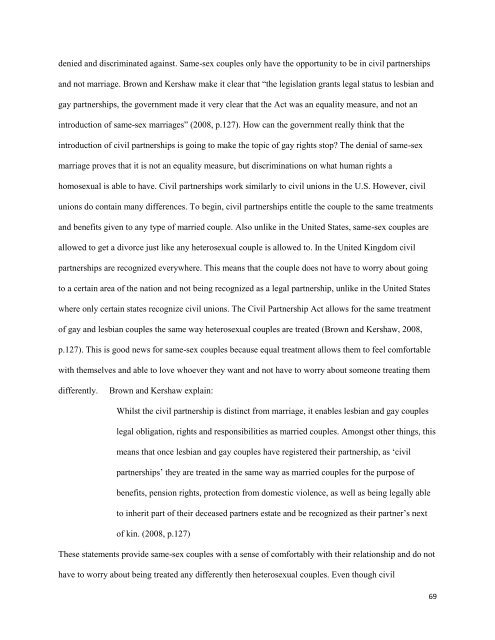Human Rights at Home and Abroad: Past, Present, and Future
Human Rights at Home and Abroad: Past, Present, and Future
Human Rights at Home and Abroad: Past, Present, and Future
You also want an ePaper? Increase the reach of your titles
YUMPU automatically turns print PDFs into web optimized ePapers that Google loves.
denied <strong>and</strong> discrimin<strong>at</strong>ed against. Same-sex couples only have the opportunity to be in civil partnerships<br />
<strong>and</strong> not marriage. Brown <strong>and</strong> Kershaw make it clear th<strong>at</strong> ―the legisl<strong>at</strong>ion grants legal st<strong>at</strong>us to lesbian <strong>and</strong><br />
gay partnerships, the government made it very clear th<strong>at</strong> the Act was an equality measure, <strong>and</strong> not an<br />
introduction of same-sex marriages‖ (2008, p.127). How can the government really think th<strong>at</strong> the<br />
introduction of civil partnerships is going to make the topic of gay rights stop? The denial of same-sex<br />
marriage proves th<strong>at</strong> it is not an equality measure, but discrimin<strong>at</strong>ions on wh<strong>at</strong> human rights a<br />
homosexual is able to have. Civil partnerships work similarly to civil unions in the U.S. However, civil<br />
unions do contain many differences. To begin, civil partnerships entitle the couple to the same tre<strong>at</strong>ments<br />
<strong>and</strong> benefits given to any type of married couple. Also unlike in the United St<strong>at</strong>es, same-sex couples are<br />
allowed to get a divorce just like any heterosexual couple is allowed to. In the United Kingdom civil<br />
partnerships are recognized everywhere. This means th<strong>at</strong> the couple does not have to worry about going<br />
to a certain area of the n<strong>at</strong>ion <strong>and</strong> not being recognized as a legal partnership, unlike in the United St<strong>at</strong>es<br />
where only certain st<strong>at</strong>es recognize civil unions. The Civil Partnership Act allows for the same tre<strong>at</strong>ment<br />
of gay <strong>and</strong> lesbian couples the same way heterosexual couples are tre<strong>at</strong>ed (Brown <strong>and</strong> Kershaw, 2008,<br />
p.127). This is good news for same-sex couples because equal tre<strong>at</strong>ment allows them to feel comfortable<br />
with themselves <strong>and</strong> able to love whoever they want <strong>and</strong> not have to worry about someone tre<strong>at</strong>ing them<br />
differently. Brown <strong>and</strong> Kershaw explain:<br />
Whilst the civil partnership is distinct from marriage, it enables lesbian <strong>and</strong> gay couples<br />
legal oblig<strong>at</strong>ion, rights <strong>and</strong> responsibilities as married couples. Amongst other things, this<br />
means th<strong>at</strong> once lesbian <strong>and</strong> gay couples have registered their partnership, as ‗civil<br />
partnerships‘ they are tre<strong>at</strong>ed in the same way as married couples for the purpose of<br />
benefits, pension rights, protection from domestic violence, as well as being legally able<br />
to inherit part of their deceased partners est<strong>at</strong>e <strong>and</strong> be recognized as their partner‘s next<br />
of kin. (2008, p.127)<br />
These st<strong>at</strong>ements provide same-sex couples with a sense of comfortably with their rel<strong>at</strong>ionship <strong>and</strong> do not<br />
have to worry about being tre<strong>at</strong>ed any differently then heterosexual couples. Even though civil<br />
69
















